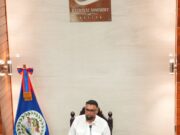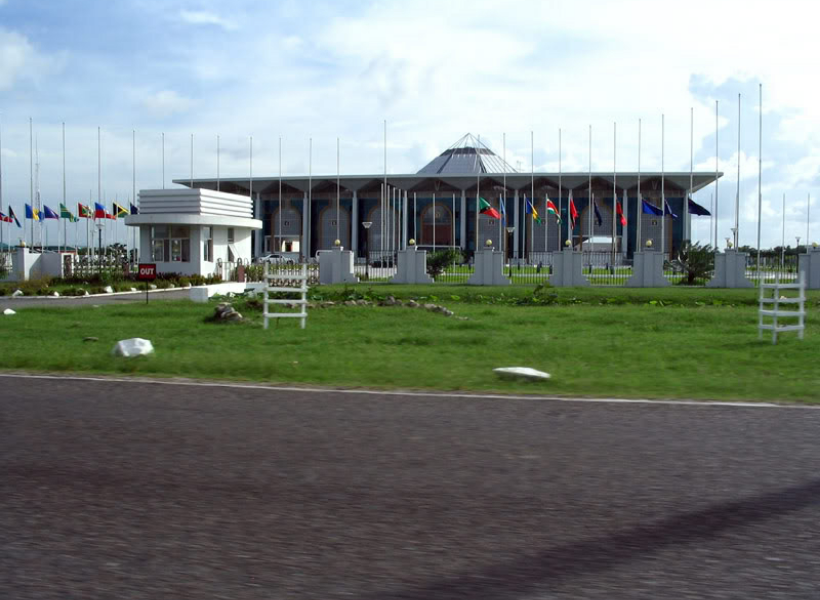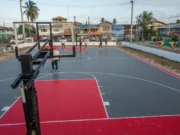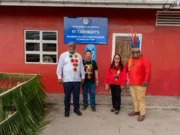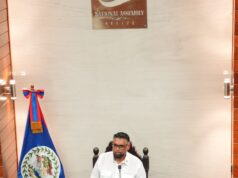After forcing myself to watch the tail-end of the West Indies collapse against Australia at Sabina Park, and listening to Carl Llewelyn Hooper’s ‘dismayed’ response to West Indies’ abysmal showing, it set me thinking. True to form, the response from Cricket West Indies (CWI) has been swift: another crisis, another committee meeting. But have we not been here before? Have these post-mortems and clinical examinations in the past not failed to bring back the (nearly) dead?
With much fanfare, the former Prime Minister of Trinidad and Tobago, Dr. the Hon. Keith Rowley, in his capacity as Chairman of the Prime Ministerial Sub-Committee on Cricket (PMSCC), hosted the CARICOM Regional Cricket Conference in April 2024, a two-day event that brought stakeholders together under the theme of “Reinvigorating West Indies Cricket”; its stated focus was on the improvement of West Indies cricket. The meeting was attended by several CARICOM Heads of Government and cricket “legends” and the outcome document was a Report on The Way Forward. That Report, prepared by Sir Clive Lloyd and High Commissioner Deryck Murray, former WI Captain and Vice-Captain respectively, was, we are told, the subject of ‘robust discussion’ at a virtual meeting of the PMSCC on 9 October, 2024.
Although it could be argued that the trail has gone cold since then, my own experience in the CARICOM Secretariat, in addressing matters such as security, climate change, covid 19, the WTO and Guyana’s elections has been that silence does not indicate inertia. Albeit the chatter has been subdued somewhat by some successes on the field, the West Indies Test team’s latest showing in Jamaica can neither be characterized as reinvigorating nor an improvement, as last year’s forum had heralded (perhaps it is too early for change to take root, the optimists might argue).
The halcyon days of the West Indian cricket team under “Skipper” Clive Lloyd up until the 1980’s were followed over time by a downward spiral, interspersed by occasional successes such as winning the three ICC championships in 2016, or individual excellence of younger players like Brian Lara, Chris Gayle, Shivnarine Chanderpaul, Ramesh Sarwan, Roger Harper and Dwayne Bravo. But Monday’s drubbing of West Indies by Australia is reminiscent of the 73-run humiliation by Kenya in 1996, which had caused serious introspection and collective soul-searching among West Indies cricket fans. Back then, CARICOM Heads of Government heard the voices of their constituents and became increasingly concerned for the future of the game; this led, inter alia, to the establishment of the PMSCC and later the famous Patterson Report on the Governance of West Indian cricket.
The debate in the Region has raged over the decades as to whether the malaise that afflicted West Indies cricket is occasioned by the governance arrangements off the field, or by players’ sub-par on-field performance, or a combination of both. While it is the recent performance on the field at Sabina Park that has occasioned the current crisis, the team was selected and coached by the front office. Fans would no doubt recall another on-field performance (or lack thereof) in India in October 2014, on the Diwali weekend, when players departed the field over a contract dispute with the WICB. Some were of the view that that crisis may have been precipitated off the field by then President of the WICB (now CWI) Jamaican Wycliffe “Dave” Cameron. However the ensuing threat of legal action from the host BCCI for $42 million in damages threw the WICB and CARICOM Governments into an alignment of sorts, as the future participation of our team in ICC-sanctioned matches was at stake (did we ever work off that debt to BCCI by scheduling games with their agreement?).
That meeting of the minds however turned out to be short-lived, with Prime Minister Ralph Gonsalves of Saint Vincent and the Grenadines accusing the WICB President of dishonoring an agreement he brokered in December 2014, for players involved in the strike not to be penalized in future tours; this was denied by Mr. Cameron. It was then for former Prime Minister of Grenada Dr. Keith Mitchell (himself a former first-class cricketer) to try to build bridges by hosting a meeting in April 2015 of the CARICOM Governance Committee on Cricket and the former CARICOM Secretary General, Ambassador Irwin LaRocque, along with a number of cricket legends – Rev. Sir Wesley Hall, Sir Garfield Sobers, Sir Vivian Richards, Sir Andy Roberts, High Commissioner Deryck Murray, Mr. Gordon Greenidge and the Management of WIBC. Sir Clive Lloyd was in attendance as an employee of the WICB and Mr. Michael Holding joined by telephone.
So last year’s meeting in Trinidad and Tobago could in fact be regarded as a repeat, albeit on a much grander scale, of the 2015 encounter in Grenada. As the person in the Secretary General’s Office charged with responsibility for the cricket dossier at that time, it was for me an immense privilege to organize the Grenada meeting and coordinate the participants’ schedules at relatively short notice and to be able to fill the room with those political and sporting giants (I recall fondly Sir Gary cautioning me in the days prior during the preparations, to reach out to him before nine o’clock in the morning, as he had taken to spending his days on the golf course!).
Of particular note was the fact that the meeting was attended by Hon. Perry Christie, former Prime Minister of The Bahamas and then Chairman of CARICOM. Although hailing from a non-cricketing territory, the Chairman felt invested enough to make the trip down the island chain to support his colleague because of the significance of the game for regional solidarity. In essence the views on the subject of cricket covered the full spectrum as regards the Community’s involvement in the game – from those who felt that politics and sport shouldn’t mix, to others who were of the view that cricket is too important to the people of the Region to let the game fall by the wayside.
In fact the attendance of Prime Minister Christie was well worth the effort as he made an impassioned plea to the legends and the WICB management, reminiscing on how powerful a force of unity, pride and glory were the West Indies tours of England when he was there as a student. In my estimation Prime Minister Christie remained fully engaged even after his Chairmanship ended, such was the importance of the challenges to the game that were facing us; every time I encountered the Prime Minister after that, whether in the margins of a CARICOM Heads of Government meeting or on the UN General Assembly floor, he never failed to begin his conversation by asking “How things going with cricket!?”.
Out of that Grenada meeting and on the basis of Terms of Reference agreed to by WICB, Prime Minister Mitchell established a distinguished Panel chaired by the then Principal of UWI Cave Hill Campus, Professor Eudene Barriteau, to review the governance arrangements of West Indies Cricket. Once again, yours truly was tasked to service the Panel: extensive consultations were held with WICB Management, cricket legends, regional politicians, the executive of other cricket administrations that had successfully carried out reforms, and other stakeholders.
The outcome document, the October 2015 Barriteau Report, called inter alia for a new operational framework for the governance structure, comprised of professionals with different skill sets like accounting, law and management, in addition to those with knowledge of both the playing and administration of the game. It also recommended new criteria for membership of a much smaller Board, with the emphasis on professional competence over territorial representation, and giving prominence to transparency and accountability. Harmonizing of the Articles of Association of the Territorial Boards was also among the recommendations.
Importantly, the Report acknowledged that cricket was a public good. Hence this “res”, this “thing” called West Indies cricket, is in effect owned by the people of the cricket-playing nations and so needed to be nurtured with their best interests at heart, notwithstanding the fact that it is managed by a private company. The Panel based its conclusion largely on a January 2015 decision of the Supreme Court of India on a matter involving India’s cricketing Board, the BCCI. The Court remarked at the power of the BCCI to make or break dreams and said that ‘[T]he functions of the Board are clearly public functions…’. It extrapolated from that and drew an analogy with the power of judicial review of similar government functions, thereby concluding that it could enquire into the workings of the BCCI.
The reality is that the analogy of the functioning of the BCCI in India is not on all fours with the WICB’s (now CWI) existence as regards West Indies cricket. Cricket in the Region is played in separate jurisdictions, but CWI is incorporated in none of them; it however has its headquarters in Antigua and Barbuda.
When WICB President Dave Cameron was invited by Prime Minister Mitchell to discuss the report, he initially signaled his unavailability. That was subsequently corrected, and required my temporary absence from the COP 21 meeting in Paris, to fly to Grenada and back in 72 hours to represent the Secretary General, who was embedded in the crucial climate change negotiations at that time. At the meeting, Mr. Cameron expressed reservations about the Report’s recommendations. Thus, like the Patterson Report and Wilkie Report before it, these recommendations did not find favour with the WICB, although the Board had green-lighted their work in the first place.
In the face of such resistance, the uneasy relationship between CARICOM, the WICB and indeed, the cricketing public, persisted. When Dave Cameron lost the CWI presidency to Richard ‘Ricky” Skerritt in 2019, many breathed a collective sigh of relief, especially those in the camp who were of the view that it was what had transpired in management off the field that had contributed to the team’s poor performance. But the record will show that President Skerritt has come and gone and has been replaced by his Vice-President, Dr. Kishore Shallow, and the problems evidently persist. I believe Mr. Cameron might have a wry smile on his face nowadays while playing golf, one of his favourite pastimes; indeed he had lamented the fact that some had tried to personalize the problems plaguing West Indies cricket.
And so, what has been the reaction of the current CWI President to the poor showing against Australia…another urgent committee meeting! I find it interesting that the meeting that he has convened is of the Cricket Strategy and Officiating Committee. Equally intriguing is that he has asked three of our former batting giants to join that meeting. So, is strategy the problem that needs to be fixed? Did officiating contribute to last Monday’s poor showing in Jamaica? Will the presence of Sir Clive, Sir Viv and Brian Lara return focus, purpose, commitment to our batting line-up, although the original committee has two other batting giants on it, Dr Shivnarine Chanderpaul and Dr. The Most Honourable Desmond Haynes? Does this mean that our current bowling line-up is firing on all cylinders? Will one meeting do the trick? Will the ‘tangible, actionable recommendations’ of this meeting that are anticipated by Dr. Shallow, and indeed the report from last year’s meeting hosted by former Prime Minister Rowley, be given any treatment different from other reports that have preceded them?
President Shallow in his statement convening the meeting, ‘calls for collaboration, not division’. And yet, in so doing, he omits from his listing of ‘everyone on board’, the governments of the Region’s cricket hosting nations, those venues where fame and fortune are won or lost.
As stated earlier, West Indies cricket is a public good, owned by the peoples of the Region. Without the cricket stadia owned by governments, there would be no cricket (it must be acknowledged however, that many of these governments look forward to cricket to attract visitors). CWI owns practically nothing as part of this “thing” called West Indies cricket, but it wields tremendous sway because of the contractual hold that it has over players, and its relationship with the ICC and the leverage it commands with commercial companies for lucrative television and sponsorship rights. Gate receipts, which primarily go to local cricket Boards, are no longer such a major consideration; even schedules and start times for the ever-popular short-format CPL have to be contractually aligned with time zones in Asia.
Regarding the way forward, in my humble estimation it is time for a sea-change in the relationship between the governments and CWI. It is also time to re-engage more with the ICC. Building on some of the recommendations in the Barriteau Report, a body of work had been commissioned by the Secretariat. That file needs to be dusted off and revisited. And, importantly, it must be done with ‘everyone on board’ Dr. Shallow, in a symbiotic way, for all to benefit. Or, we could consider doing what that despondent cricket fan previously proposed, and dig up all the cricket fields and plant cassava and ganja!
Neville. J. Bissember
